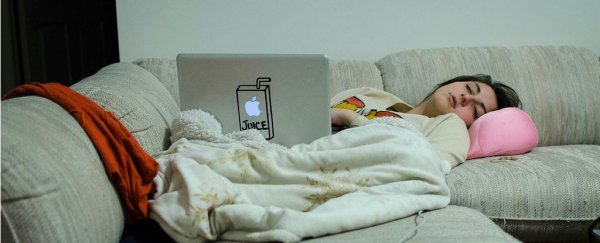Australian researchers have found that night owls are more likely to struggle after a bad night's sleep than early risers, and using computers and smartphones before bed is only making the problem worse.
It's well documented that some people are able to cope with missing a few hours of sleep every night, while others struggle to focus the next day, but scientists still don't fully understand what causes these differences. Now, results of a new study led by Monash University suggest that the time someone's body starts to produce melatonin - the hormone that makes us feel sleepy - may play a significant role in determining how well we bounce back.
"Some people can cope with losing a little bit of sleep but others are quite vulnerable," lead researcher Tracey Sletten told Anna Salleh at ABC Science. "We're looking at the factors that determine this."
To figure this out, the researchers studied the effects of sleep deprivation on 43 healthy adults. For the first three weeks of the study, the participants were all required to get 8 hours' sleep and go to bed at the same time each night, but they could choose when that was between 9.50pm and 1am.
After using activity monitors and sleep diaries to document the participants' 'baseline' sleep patterns, the team then restricted their sleep over two nights. On the first night, participants were required to stay up 3 hours later than they normally would. On the second night, they stayed in a sleep lab, where they were kept awake for most of the night and only got 3 hours' sleep. The researchers also monitored their melatonin levels throughout the night with saliva tests.
The next day the participants were tested on their response times and asked how sleepy or alert they felt after two nights of bad sleep. The researchers found that those who performed the worst the next day also happened to start producing melatonin much later than their peers.
"Effectively it comes down to the timing of a person's body clock," said Sletten. "We all have this approximate 24-hour rhythm that is internally driven, but some people are timed earlier and some people are timed later."
In an ideal world, melatonin would be produced 2 hours before we naturally fall asleep, but the study revealed that this actually happened anywhere from 4 hours in advance to after a participant had already gone to bed. And it was those with the 'late' body clocks that struggled the most the next day.
"These people are at high risk because of the timing of their body clock," Sletten told Salleh. "They are much more likely to have slowed reaction times, an impaired mood, and to feel more sleepy."
The ideal solution would be to allow everyone to start work and school whenever it suits their body, but obviously this isn't going to happen any time soon. Instead, Sletten suggests that those who struggle to feel alert in the mornings should avoid smartphones and computer screens at night.
"This is giving us light which is suppressing melatonin and delaying our body clock further and therefore increasing risks of impairment the next morning," she said.
The results have been published in PLOS ONE.
